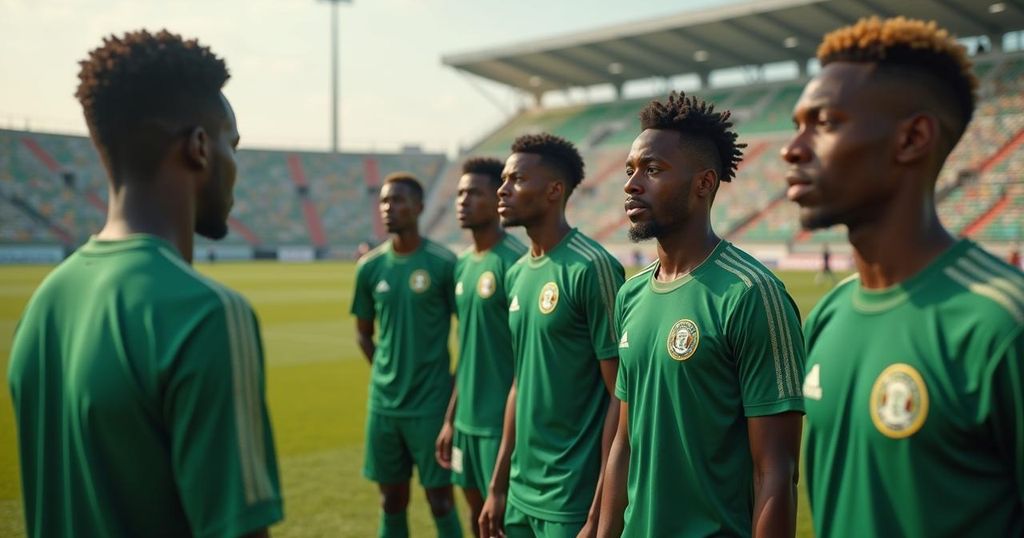Nigeria Team Withdraws from AFCON Qualifier Following Inhumane Treatment in Libya
The Nigeria Football Federation decided to fly the national team back home after they were subjected to “inhumane treatment” in Libya. The team, led by William Troost-Ekong, chose to forfeit their Africa Cup of Nations qualifier due to safety concerns after being stranded at an abandoned airport for over 15 hours. Former player Victor Ikpeba supports the team’s decision and has called for sanctions against Libya, questioning the suitability of Libya as a host for international matches.
The Nigeria Football Federation (NFF) has announced plans to return the national football team back to Nigeria following allegations of “inhumane treatment” in Libya. The Nigerian team, captained by William Troost-Ekong, opted to forfeit the Africa Cup of Nations qualifier against Libya due to safety apprehensions after being stranded at an abandoned airport for over 15 hours. NFF director of communications, Ademola Olajire, confirmed that the players have collectively resolved against participating in the match, prompting immediate arrangements for their return home. Furthermore, the NFF has lodged a formal complaint with the Confederation of African Football (CAF). Reports indicate that upon arrival in Libya, the Nigerian players were unable to secure assistance from their embassy as intervention required the approval of the Libyan government. Captain Troost-Ekong, expressing concerns over the safety of the team’s travel, stated on social media, “As the team captain together with the team we have decided that we will NOT play this game. Let them have the points. We will not accept to travel anywhere by road here even with security it’s not safe. We can only imagine what the hotel or food would be like given to us if we continued.” Former African footballer of the year, Victor Ikpeba, who accompanied the team, has publicly condemned the treatment of the players and called for sanctions against Libya, stating, “If CAF know their job, Libya ought to be banned from international football. This is a high-risk country and one really wonders who approved for Libya to be playing their games at home.” Ikpeba went on to describe the conditions experienced while in Libya, asserting, “We were locked up in an abandoned airport for more than 10 hours like hostages. The team will call off their bluff and not play this match.” This incident follows Nigeria’s previous 1-0 victory against Libya in a match held in Uyo, where Nigeria currently leads Group D with seven points from three matches.
The situation involving the Nigerian football team’s treatment in Libya has raised significant concerns regarding player safety and the appropriateness of hosting international matches in countries with unstable conditions. Libya has been classified as high-risk due to persistent political instability and security issues, leading to calls for stricter oversight from continental governing bodies like CAF. This incident serves to highlight the broader implications of travel and safety regulations in sports diplomacy, particularly in regions with ongoing conflicts or governance challenges. The decision of the Nigerian team to forfeit the match not only affects their standings in the Africa Cup of Nations qualifiers but also sheds light on the need for safer conditions for athletes traveling abroad. The responses from sports figures, notably Victor Ikpeba, emphasize a growing discontent with how the situation was managed and the urgent need for international bodies to reassess their criteria for hosting sporting events.
The incident involving the Nigerian football team in Libya underscores critical issues surrounding athlete safety and the responsibilities of governing bodies in international sports. The NFF’s decision to withdraw the team from the Africa Cup of Nations qualifier due to allegations of inhumane treatment and unsafe conditions illustrates the drastic measures teams may need to consider in light of security concerns. As the NFF prepares to return home, the broader discourse surrounding Libya’s capacity to host international matches may warrant further investigation from CAF and other stakeholders in the realm of sports governance. This situation serves as a reminder of the paramount importance of athletes’ safety and welfare in competitive sports.
Original Source: www.news24.com




Post Comment